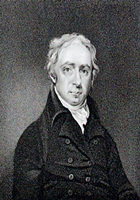William Lisle Bowles
William Lisle Bowles Poems
Frown ever opposite, the angel cried,
Who, with an earthquake's might and giant hand,
...
How shall I meet thee, Summer, wont to fill
My heart with gladness, when thy pleasant tide
First came, and on the Coomb's romantic side
...
Thou, whose stern spirit loves the storm,
That, borne on Terror's desolating wings,
Shakes the high forest, or remorseless flings
...
O stay, harmonious and sweet sounds, that die
In the long vaultings of this ancient fane!
Stay, for I may not hear on earth again
Those pious airs--that glorious harmony;
...
There is strange music in the stirring wind,
When lowers the autumnal eve, and all alone
To the dark wood's cold covert thou art gone,
...
The tide of fate rolls on!--heart-pierced and pale,
The gallant soldier lies, nor aught avail,
...
Languid, and sad, and slow, from day to day
I journey on, yet pensive turn to view
(Where the rich landscape gleams with softer hue)
The streams and vales, and hills, that steal away.
...
When I lie musing on my bed alone,
And listen to the wintry waterfall;
...
O TIME! who know'st a lenient hand to lay
Softest on sorrow's wound, and slowly thence
(Lulling to sad repose the weary sense)
The faint pang stealest unperceived away;
...
As o'er these hills I take my silent rounds,
Still on that vision which is flown I dwell,
On images I loved, alas, too well!
...
To him, who, many a night upon the main,
At mid-watch, from the bounding vessel's side,
Shivering, has listened to the rocking tide,
...
Toll Nelson's knell! a soul more brave
Ne'er triumphed on the green-sea wave!
Sad o'er the hero's honoured grave,
Toll Nelson's knell!
...
O POVERTY! though from thy haggard eye,
Thy cheerless mein, of every charm bereft,
Thy brow, that hope's last traces long have left,
...
Beautiful landscape! I could look on thee
For hours,--unmindful of the storm and strife,
And mingled murmurs of tumultuous life.
Here, all is still as fair--the stream, the tree,
...
Clysdale! as thy romantic vales I leave,
And bid farewell to each retiring hill,
Where musing memory seems to linger still,
...
Languid, and sad, and slow, from day to day
I journey on, yet pensive turn to view
(Where the rich landscape gleams with softer hue)
The streams and vales, and hills, that steal away.
...
I climb the highest cliff; I hear the sound
Of dashing waves; I gaze intent around;
I mark the gray cope, and the hollowness
...
How soothing sound the gentle airs that move
The innumerable leaves, high overhead,
When autumn first, from the long avenue,
...
As slow I climb the cliff's ascending side,
Much musing on the track of terror past,
...
William Lisle Bowles Biography
Bowles was born at Northamptonshire and educated at Trinity College, Oxford, receiving his Batchelor of Arts in 1786 and Master of Arts in 1792. He was ordained deacon in 1788. He served as curate at Wiltshire (1788), rector at Chicklade (1795), Dumbleton (1797) and Bremhill, Wiltshire (1804). He became prebendary (1804) and canon residentiary (1828) at Salisbury Cathedral. Though he mostly led a city life as a clergyman and magistrate, his writings reveal a longing for rural retirement. Though his first work was well received by the early romantic poets, most of his work is no longer read. He is remembered for his long public argument with Byron, known as the "Pope-Bowles controversy", in which Byron, along with others like Thomas Campbell, ardently defended Pope's greatness and true rank among poets.)
The Best Poem Of William Lisle Bowles
Art And Nature
THE BRIDGE BETWEEN CLIFTON AND LEIGH WOODS.
Frown ever opposite, the angel cried,
Who, with an earthquake's might and giant hand,
Severed these riven rocks, and bade them stand
Severed for ever! The vast ocean-tide,
Leaving its roar without at his command,
Shrank, and beneath the woods through the green land
Went gently murmuring on, so to deride
The frowning barriers that its force defied!
But Art, high o'er the trailing smoke below
Of sea-bound steamer, on yon summit's head
Sat musing; and where scarce a wandering crow
Sailed o'er the chasm, in thought a highway led;
Conquering, as by an arrow from a bow,
The scene's lone Genius by her elfin-thread.
